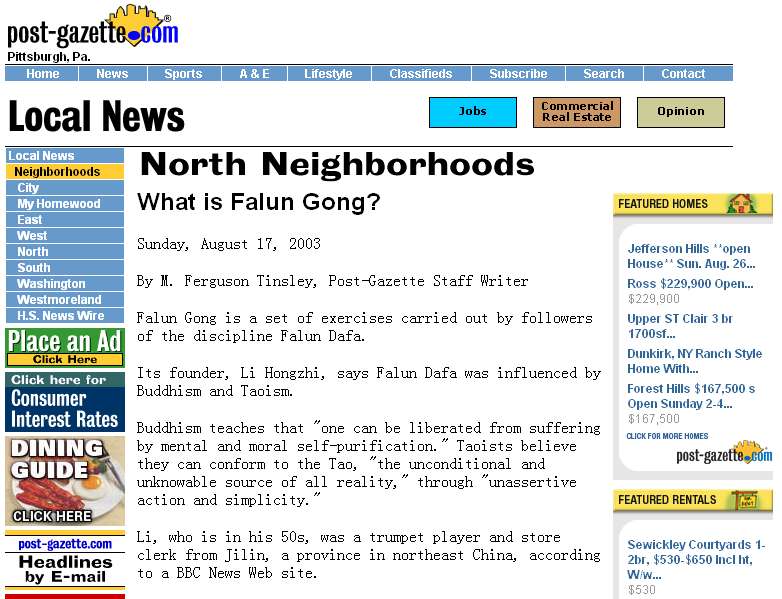Falun Gong is a set of exercises carried out by followers of the discipline Falun Dafa.
Its founder, Li Hongzhi, says Falun Dafa was influenced by Buddhism and Taoism.
Buddhism teaches that "one can be liberated from suffering by mental and moral self-purification." Taoists believe they can conform to the Tao, "the unconditional and unknowable source of all reality," through "unassertive action and simplicity."
Li, who is in his 50s, was a trumpet player and store clerk from Jilin, a province in northeast China, according to a BBC News Web site.
He studied with a Taoist monk when he was a youngster and began teaching Falun Dafa in China in 1992. He said that the philosophy and its exercises had been practiced in private for 5,000 years.
He wrote "Zhuan Falun," a sort of bible for Falun Gong followers.
In a May 10, 1999, interview with "Time Asia," Li was asked whether he were human and whether he had come from Earth.
He answered: "You can think of me as human. I don't wish to talk about myself at a higher level. People wouldn't understand it."
He said the chaos in the world is caused by disbelief in God and the influence of alien beings.
When Li first introduced Falun Gong in China, the government welcomed the new teaching that promoted truth, compassion and forbearance.
But by 1996, he had lost favor with the government. Consequently, a campaign against him and against Falun Gong grew. In 1998, Li, whose followers call him "the Master," moved to New York. His current residence could not be determined.
According to McCandless residents Lingfang Kong and Xiaoyan Liu, two local Fulan Gong practitioners, practitioners in China numbered in the thousands by the time Li left.
In April 1999, the Chinese government ordered a crackdown on the practice. The government said that the group promoted suicide and murder and dissuaded its members from seeking medical help.
The Rev. Caleb Chang, senior pastor of the Pittsburgh Chinese Christian Church in McCandless, detests what the Chinese government is doing to Falun Gong believers but believes that Falun Gong manipulates its followers.
"As Christians, we are against Falun Gong," he said."Because it's not just exercises to help people live a healthy life." Chang said that emptying one's mind to perform deep meditation can cause one "to see things and experience things they shouldn't. It can take one into a spiritual world occupied by the evil spirits."
Furthermore, he said, he is suspicious of Li's claims that Falun Dafa is an ancient practice.
"I'm 53 years old," Chang said. "I grew up in Taiwan. I grew up in a Buddhist family and I never heard of Falun Gong. It is definitely the creation of Li Hongzhi."
The Rev. Kyoki Roberts, the senior priest at the Zen Temple of the Buddhist Society of Pittsburgh, said she is only slightly familiar with Falun Gong.
"There's nothing in Buddhism like there is in Christianity," the 20-year adherent said. "There aren't different sects. Buddhism is part of the Asian culture."
Still, she said, if Falun Gong follows the basic tenets of Buddhism, it could fit into that expansive world view.
"The three pure precepts are: Do no harm, do good and help all beings."
If the Chinese government's claims that Falun Gong promotes suicide are true, then the teaching is outside the pale of Buddhism, Roberts said.
"There's nothing in Buddhism that says you can commit suicide. It's never condoned."
(Post-Gazette, August 17, 2003)

Original text from: http://www.post-gazette.comeigh_north/20030817ncoverside0817p5.asp





